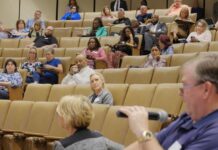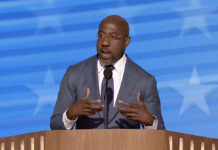
Neighbors of the three white men convicted of murdering Ahmaud Arbery testified at their hate crimes trial Tuesday about how a quiet afternoon in their community was shattered by three shotgun blasts and the sight of a young man’s body sprawled in the street.
“I felt guilty that it happened outside my house,” said Dan Allcott, who was home with his wife and their baby when Arbery fell dead a few feet from Allcott’s driveway on Feb. 23, 2020.
Police found bloodstains and shotgun shells in Allcott’s yard. He said he later met Arbery’s parents when they came to inspect the scene and let them place a wooden cross with a wreath in his yard. He moved his family to a different neighborhood months afterward.
“The house didn’t feel the same anymore,” Allcott testified. “It didn’t feel like home anymore.”
Father and son Greg and Travis McMichael armed themselves and used a pickup truck to chase Arbery after spotting him running in their coastal Georgia neighborhood that day, a Sunday. A neighbor, William “Roddie” Bryan, joined the chase in his own truck and recorded cellphone video of Travis McMichael shooting Arbery.
No arrests were made until the video leaked online two months later.
Both McMichaels and Bryan were convicted of murder last fall in a Georgia state court and sentenced to life in prison.
All three are now standing trial in a separate case in U.S. District Court, where they are charged with violating Arbery’s civil rights and with targeting him because he was Black. They have pleaded not guilty.
A jury of eight white members, three Black people and one Hispanic person was sworn in Monday to hear the case. The judge in the case on Monday filed a written order requiring the jurors to be sequestered throughout the trial to protect them from “trial publicity, extraneous influences and harassment” and to ensure a fair trial.
On the day of the shooting, another neighbor, Matt Albenze, called police using a nonemergency number when he spotted Arbery entering a home under construction where security cameras had previously recorded Arbery.
Albenze was on the phone with police when Arbery ran from the house toward the home of the McMichaels. Albenze said he saw their truck back out of the driveway as they gave chase.
Pete Theodocion, Bryan’s defense attorney, asked Albenze if he still would have called police had the man entering the unfinished home been white or Hispanic.
“Nothing you did that day, none of the words or actions, were based on Mr. Arbery being African American, is that correct?” Theodocion asked.
“Correct,” Albenze replied.
He said he heard the gunshots minutes later, and rode his bike to the scene of the shooting but kept his distance after seeing the man he’d reported to police lying dead in the road. Albenze said he went home and poured himself a vodka.
Albenze testified that when he grabbed his cellphone to call police he also slipped a handgun into the pocket of his overalls. Asked by prosecutor Bobbi Bernstein if he ever shouted at Arbery to stop, drew his gun or pointed it at Arbery, Albenze said no.
“It’s not my job,” he said.
Georgia Bureau of Investigation agent Richard Dial, who led the agency’s investigation into Arbery’s death, testified Tuesday afternoon.
While he was on the stand, the jury watched three versions of the cellphone video of the shooting: the original, a slow-motion version and a version that’s zoomed in and stabilized to reduce shaky hand motion.
Travis McMichael’s lawyer, Amy Lee Copeland, objected to the last version being shown, saying the jury would be seeing the video a third time. The judge overruled her objection.
The jury also saw a clip from the body camera of the first officer on the scene, which showed the McMichaels standing in the road where Arbery lay after being shot. The clip shows Arbery’s head and right leg move. The video was shown without sound, but Dial said if the sound was on, Arbery’s “dying gasps” would be audible.
On the trial’s first day in the port city of Brunswick on Monday, prosecutors told the jury they have evidence that each of the defendants had a history of making racist comments. To win convictions on the hate crime charges, they must prove to the jury that Arbery was chased and fatally shot because he was Black.
In their opening statements, defense attorneys called their clients’ use of racist slurs offensive and indefensible. But they insisted that their deadly pursuit of Arbery was motivated by an earnest, though erroneous, suspicion that the 25-year-old Black man had committed crimes — not by racial hostility.
This article appears on Now Habersham through a news partnership with GPB News







